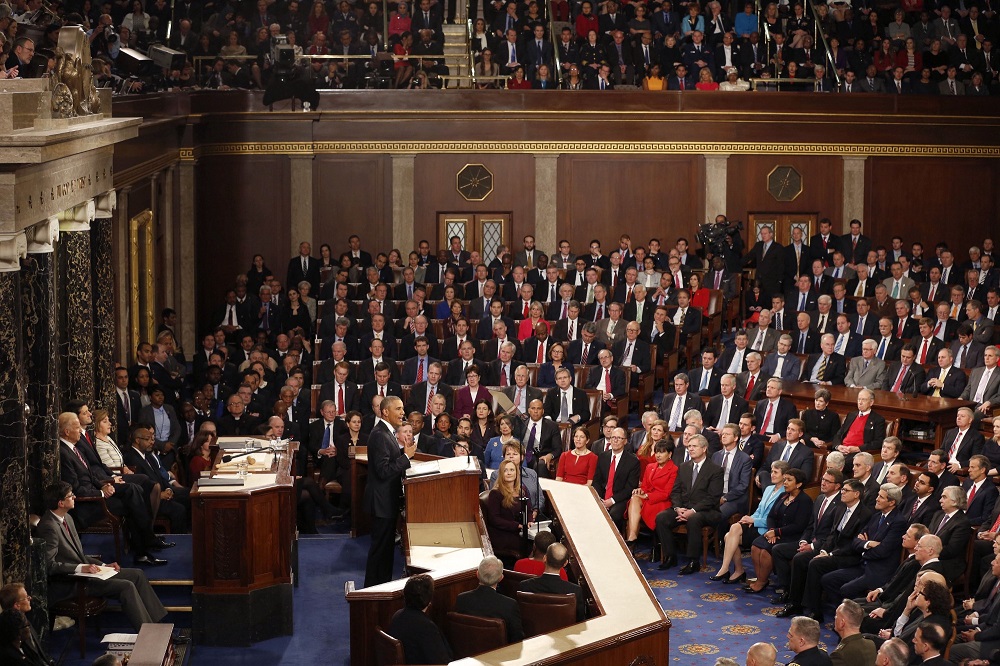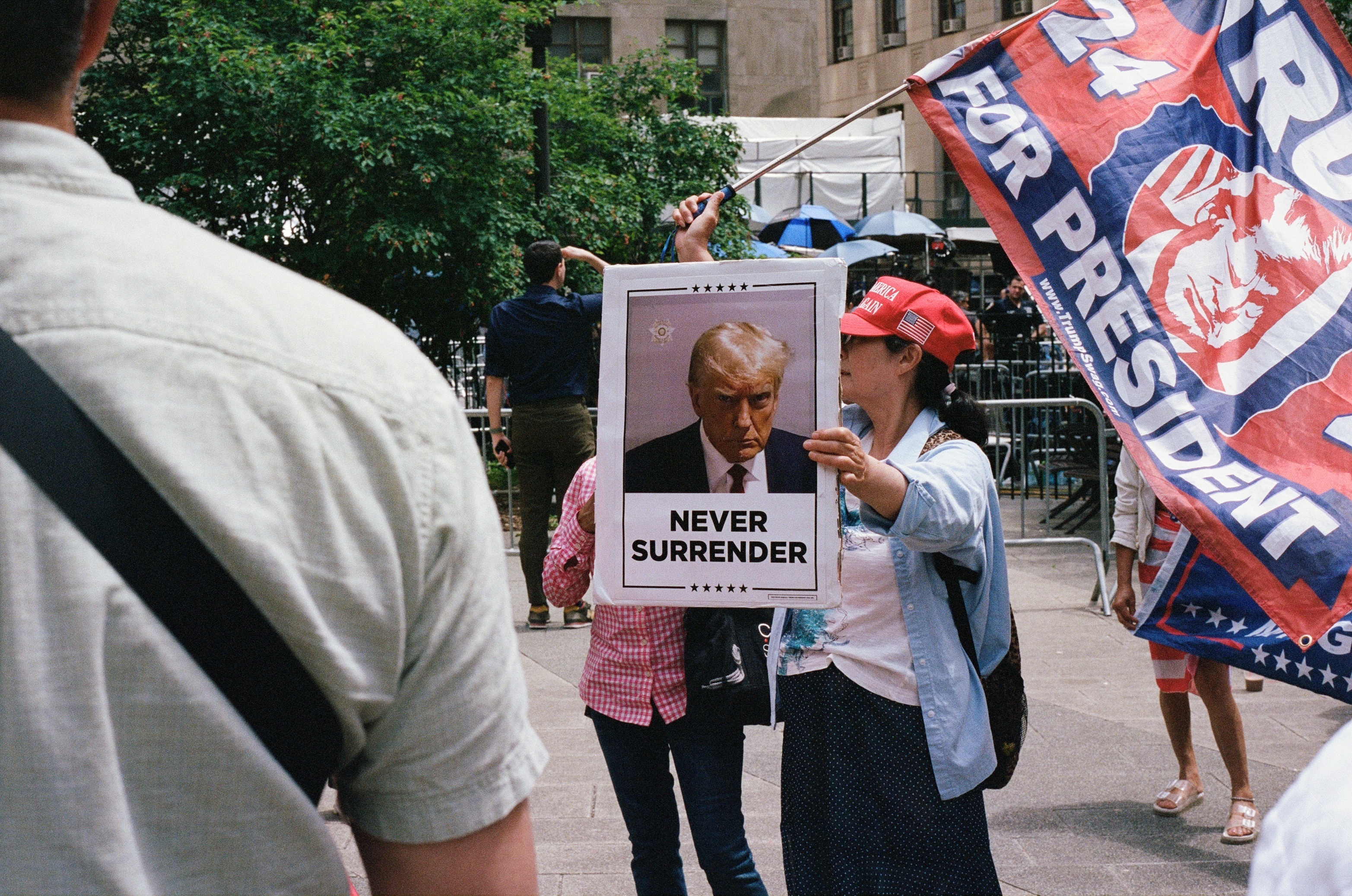We Watched the State of the Union So You Don't Have To
We watched the State of the Union so you don’t have to.
With an eye towards the national security sections of the speech, we’ve selected the parts we think are most relevant to Lawfare readers, organizing them by subject matter. While you can read the President's full comments on those subjects below, here’s a brief summary:

Published by The Lawfare Institute
in Cooperation With

We watched the State of the Union so you don’t have to.
With an eye towards the national security sections of the speech, we’ve selected the parts we think are most relevant to Lawfare readers, organizing them by subject matter. While you can read the President's full comments on those subjects below, here’s a brief summary:
The president called for the closure of Guantanamo Bay, a new authorization for the use of military force against ISIS, the lifting of the Cuban embargo, and the passage of the Trans-Pacific Partnership. But more than a list of congressional acts, Obama also asked Americans to show resilience in the face of terrorism and to realize that while the threats Americans face today are real, most of them are not existential, at least to the United States as a nation. The changing complexion of these threats, according to the president, means that “in today’s world, we’re threatened less by evil empires and more by failing states.”
Those failing states though do eventually provide safe havens for terrorist groups and incubation periods for the next pandemic, and under Obama’s formulation require “a wise application of military power, and rallying the world behind causes that are right.” The president presented the crises of the day as a question of “how to keep America safe and strong without either isolating ourselves or trying to nation-build everywhere there’s a problem.”
Yet while discussing those threats and the importance of building broader global engagement, which he called a “smarter approach” than nation-building or isolation, the president cited Syria as an example of success, prompting reproach from a number of commentators. And speaking of the failed and failing states in the Middle East, Obama said that the region was “going through a transformation that will play out for a generation, rooted in conflicts that date back millennia,” suggesting there is little the United States can do to solve the underlying conflict in the region. (The “ancient hatreds” argument is one that is controversial, to say the least.)
Overall, Obama’s primary thrust was to counsel a middle approach—one that recognizes the strength of the United States and its corresponding responsibility on the world stage, but that does not view every problem through the lense of a conflict to be settled from the bay of a bomber or the barrel of a gun. That comprehensive approach to national security policy and decisionmaking is the “strength” and the “leadership” the world needs from the United States, and its a “kind of leadership that depends on the power of our example.”
***
American Leadership
And that’s why the third big question we have to answer is how to keep America safe and strong without either isolating ourselves or trying to nation-build everywhere there’s a problem.
The United States of America is the most powerful nation on Earth. Period. It’s not even close. We spend more on our military than the next eight nations combined. Our troops are the finest fighting force in the history of the world. No nation dares to attack us or our allies because they know that’s the path to ruin. Surveys show our standing around the world is higher than when I was elected to this office, and when it comes to every important international issue, people of the world do not look to Beijing or Moscow to lead — they call us.
As someone who begins every day with an intelligence briefing, I know this is a dangerous time. But that’s not because of diminished American strength or some looming superpower. In today’s world, we’re threatened less by evil empires and more by failing states. The Middle East is going through a transformation that will play out for a generation, rooted in conflicts that date back millennia. Economic headwinds blow from a Chinese economy in transition. Even as their economy contracts, Russia is pouring resources to prop up Ukraine and Syria — states they see slipping away from their orbit. And the international system we built after World War II is now struggling to keep pace with this new reality.
It’s up to us to help remake that system. And that means we have to set priorities.
[...]
American leadership in the 21st century is not a choice between ignoring the rest of the world — except when we kill terrorists; or occupying and rebuilding whatever society is unraveling. Leadership means a wise application of military power, and rallying the world behind causes that are right. It means seeing our foreign assistance as part of our national security, not charity. When we lead nearly 200 nations to the most ambitious agreement in history to fight climate change — that helps vulnerable countries, but it also protects our children. When we help Ukraine defend its democracy, or Colombia resolve a decades-long war, that strengthens the international order we depend upon. When we help African countries feed their people and care for the sick, that prevents the next pandemic from reaching our shores. Right now, we are on track to end the scourge of HIV/AIDS, and we have the capacity to accomplish the same thing with malaria — something I’ll be pushing this Congress to fund this year.
That’s strength. That’s leadership. And that kind of leadership depends on the power of our example.
Terrorism
Priority number one is protecting the American people and going after terrorist networks. Both al Qaeda and now ISIL pose a direct threat to our people, because in today’s world, even a handful of terrorists who place no value on human life, including their own, can do a lot of damage. They use the Internet to poison the minds of individuals inside our country; they undermine our allies.
But as we focus on destroying ISIL, over-the-top claims that this is World War III just play into their hands. Masses of fighters on the back of pickup trucks and twisted souls plotting in apartments or garages pose an enormous danger to civilians and must be stopped. But they do not threaten our national existence. That’s the story ISIL wants to tell; that’s the kind of propaganda they use to recruit. We don’t need to build them up to show that we’re serious, nor do we need to push away vital allies in this fight by echoing the lie that ISIL is representative of one of the world’s largest religions. We just need to call them what they are — killers and fanatics who have to be rooted out, hunted down, and destroyed.
That’s exactly what we are doing. For more than a year, America has led a coalition of more than 60 countries to cut off ISIL’s financing, disrupt their plots, stop the flow of terrorist fighters, and stamp out their vicious ideology. With nearly 10,000 air strikes, we are taking out their leadership, their oil, their training camps, and their weapons. We are training, arming, and supporting forces who are steadily reclaiming territory in Iraq and Syria.
If this Congress is serious about winning this war, and wants to send a message to our troops and the world, you should finally authorize the use of military force against ISIL. Take a vote. But the American people should know that with or without Congressional action, ISIL will learn the same lessons as terrorists before them. If you doubt America’s commitment — or mine — to see that justice is done, ask Osama bin Laden. Ask the leader of al Qaeda in Yemen, who was taken out last year, or the perpetrator of the Benghazi attacks, who sits in a prison cell. When you come after Americans, we go after you. It may take time, but we have long memories, and our reach has no limit.
Safe Havens and Failed States
Our foreign policy must be focused on the threat from ISIL and al Qaeda, but it can’t stop there. For even without ISIL, instability will continue for decades in many parts of the world — in the Middle East, in Afghanistan and Pakistan, in parts of Central America, Africa and Asia. Some of these places may become safe havens for new terrorist networks; others will fall victim to ethnic conflict, or famine, feeding the next wave of refugees. The world will look to us to help solve these problems, and our answer needs to be more than tough talk or calls to carpet bomb civilians. That may work as a TV sound bite, but it doesn’t pass muster on the world stage.
We also can’t try to take over and rebuild every country that falls into crisis. That’s not leadership; that’s a recipe for quagmire, spilling American blood and treasure that ultimately weakens us. It’s the lesson of Vietnam, of Iraq — and we should have learned it by now.
Fortunately, there’s a smarter approach, a patient and disciplined strategy that uses every element of our national power. It says America will always act, alone if necessary, to protect our people and our allies; but on issues of global concern, we will mobilize the world to work with us, and make sure other countries pull their own weight.
That’s our approach to conflicts like Syria, where we’re partnering with local forces and leading international efforts to help that broken society pursue a lasting peace.
Iran
That’s why we built a global coalition, with sanctions and principled diplomacy, to prevent a nuclear-armed Iran. As we speak, Iran has rolled back its nuclear program, shipped out its uranium stockpile, and the world has avoided another war.
Ebola
That’s how we stopped the spread of Ebola in West Africa. Our military, our doctors, and our development workers set up the platform that allowed other countries to join us in stamping out that epidemic.
Trans-Pacific Partnership
That’s how we forged a Trans-Pacific Partnership to open markets, protect workers and the environment, and advance American leadership in Asia. It cuts 18,000 taxes on products Made in America, and supports more good jobs. With TPP, China doesn’t set the rules in that region, we do. You want to show our strength in this century? Approve this agreement. Give us the tools to enforce it.
Cuba
Fifty years of isolating Cuba had failed to promote democracy, setting us back in Latin America. That’s why we restored diplomatic relations, opened the door to travel and commerce, and positioned ourselves to improve the lives of the Cuban people. You want to consolidate our leadership and credibility in the hemisphere? Recognize that the Cold War is over. Lift the embargo.
Guantanamo Bay
And that kind of leadership depends on the power of our example. That is why I will keep working to shut down the prison at Guantanamo: it’s expensive, it’s unnecessary, and it only serves as a recruitment brochure for our enemies.




